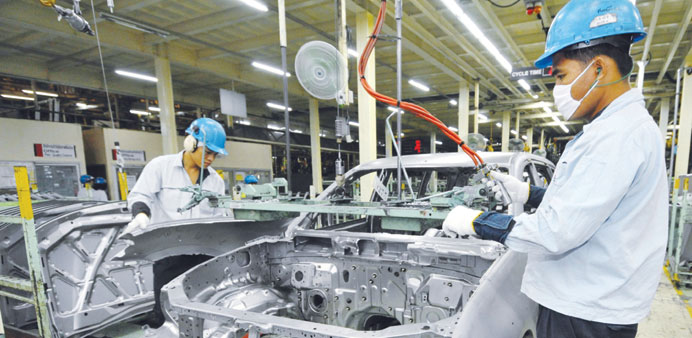Reuters
Bangkok
Thai factory output fell nearly twice as much as expected in June, the latest piece of data showing that easing political tension is not yet generating a revival for the struggling economy.
The poor output figures increases worries that Southeast Asia’s second-largest economy may have slipped into recession in the second-quarter, though the finance ministry said there was a little growth in April-June.
Recent data also suggests the economy may not recover as quickly in the second-half of the year as the government and some economists expect.
Barnabas Gan, economist with OCBC Bank in Singapore, said the poorer than expected manufacturing data reinforces his expectation for a contraction in the second quarter, “suggesting that a technical recession is on the cards.” Economists define recession as two consecutive quarters of shrinkage.
In June, factory output dropped 6.6% from a year earlier, the industry ministry said yesterday. That is worse than the 3.5% drop forecast in a Reuters poll.
Shortly after the data was released, the finance ministry cut its full-year growth forecast to 2% from the 2.6% figure in gave in March – two months before the army seized power to seek to end political turmoil and kick-start the struggling economy.
For the second-quarter, the ministry said there will be an expansion of 0.2% from January-March, when it contracted 2.1% from the prior three months.
The ministry’s 2014 forecast is above the 1.8% seen in a Reuters poll and the latest 1.5% forecast from the Bank of Thailand (BoT) of 1.5% – nearly half its previous 2.7% projection.
The central bank in June predicted growth of more than 1% in April-June from the previous quarter and a contraction of 0.4% from a year earlier.
It said after contracting in the first-half, the economy will rebound in the second. Thailand will announce second-quarter gross domestic product (GDP) data on August 18.
The government and some economists appear to be basing their modest growth assumptions for the second-quarter on an expected pick-up in consumer spending, especially after the military government freed up long-delayed payments to farmers.
But there’s scant evidence yet that private demand, which accounts for about half of GDP has improved.
Manufacturing activity isn’t improving. June was the 15th straight month of lower factory output, on an annual basis. Capacity utilisation in industry was 60.61%, down from 61.56% in May.
A director-general in the industry ministry, Somchai Harnhirun, told reporters it would cut its forecast for factory output this year from 1.5-2.0%. It fell 6.1% in the first half of the year.
He didn’t give a new figure, but said it was difficult for output to grow more than 1%, given the high base in the auto industry in 2013 – and “still volatile” global markets.
Credit Suisse, in a note, said its current forecast isn’t for a technical recession – it is for “mild” growth in the second quarter – but the “disappointing” June output “implies a risk that the economy may have slipped into a technical recession” in the latest quarter.
On Monday, Thailand reported a 3.9% year-on-year increase in exports in June, but a 14% plunge in imports – many of which go into exports.
In its new projections, the finance ministry saw exports increasing only 1.5% this year, down from its earlier 5% forecast.
Thailand is a regional hub and export base for global automakers and a major producer of hard disk drives. Industrial goods account for about 65% of total exports, and exports are equivalent for more than 60% of the economy.
This year, Thai exports have remained sluggish, even though the political crisis has not affected factories or ports, and the world economy has somewhat improved.
Thammarat Kittisiripat, economist with TMB Bank in Bangkok, said the June output “mainly reflects sluggish domestic economic activity. But it’s probably reached the worst for manufacturing, and output should recover gradually in the second half.”
A quarterly contraction in April-June is avoidable, he said, and the second-half can grow 4.2% from a year earlier, resulting in full-year growth of 2%.
The big, pivotal auto industry is hurting from weak domestic demand.
Auto sales in Thailand are expected to fall 31% in 2014 but could recover in 2015 as the domestic economy and consumption improves, Kyoichi Tanada, president of Toyota’s Thai unit said on Tuesday.
“It’s a psychological impact that hurts the purchasing decision,” he said. “For the second half, with a positive political direction and a recovery of the domestic economy, the purchasing decision should improve.”
Last week, the Federation of Thai Industries expected auto production this year to fall by 10.5% to 2.2mn vehicles from last year. In the first half, vehicle sales slumped 40.5% from a year earlier, it said. The retail sector may grow 6-7% this year, said Chatrchai Tuongratanathan, executive director of the Thai Retailers Association.
The new military government is still working to fast-track long-dormant spending plans such as infrastructure projects, while tourism continues to feel the pinch from months of unrest.

